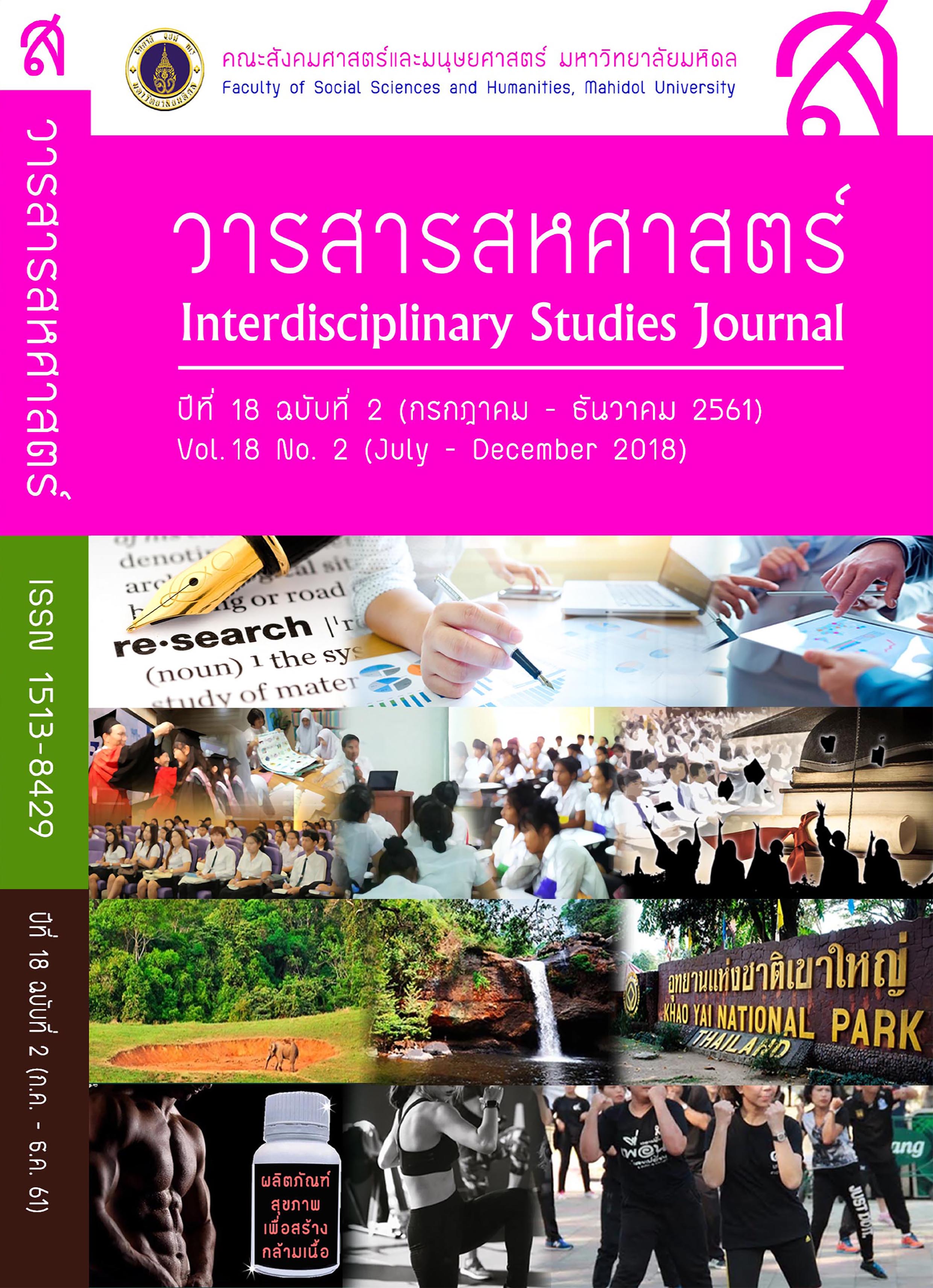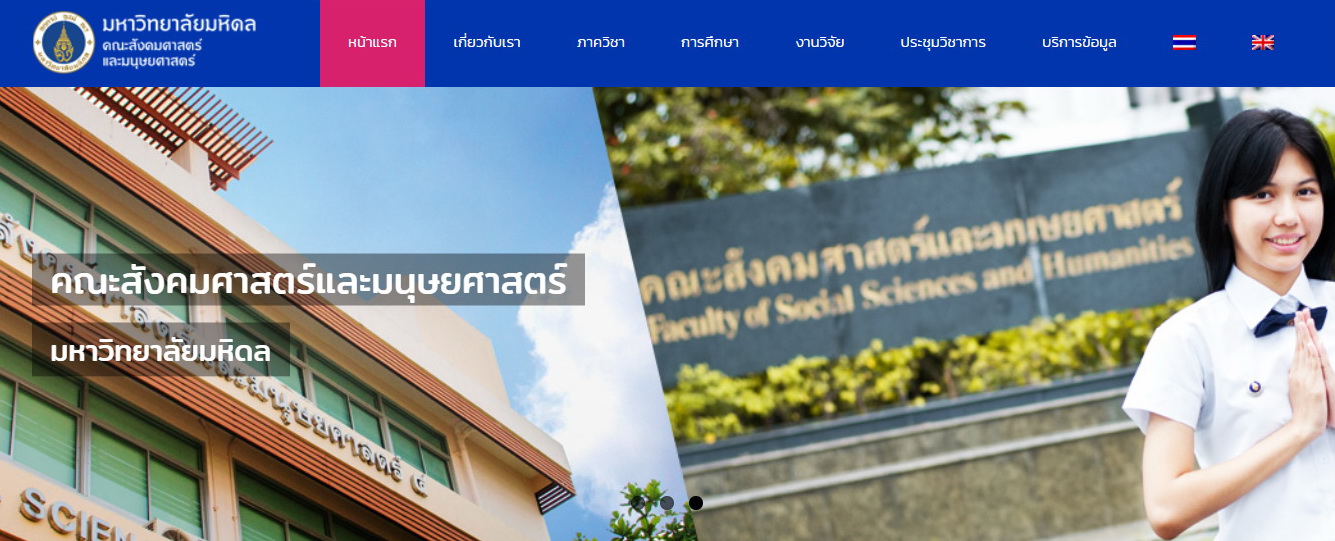Liberal forms of exclusion in international education: A postcolonial reading
บทคัดย่อ
Over the past two decades, the cultural politics of race and gender in language education has received a great deal of attention. However, this is less so in Southeast Asian countries such as Thailand. This is not so much because these issues are absent from education in Southeast Asia, but more because, in countries such as Thailand, there is a great deal of unwillingness to examine questions related to race, even though aspects of international education in Thailand is profoundly raced and racist. This is evident indirectly in the curriculum and pedagogy, and more directly in employment recruitment and staffing of language centers, be they international schools, private language schools, language departments within private schools, or government and semi-government agencies such as the British Council, and Thai government universities. In fact, the racist privileging and exclusion has a mundane sameness throughout the industry, with Whites, especially those of Anglo-American background, capitalizing on the easy association Thais make between skin color and English language proficiency. The paper is divided into two parts. First, drawing from a wide range of in-school publication and press articles, it documents and analyzes, in a close-up way, the techniques and strategies of the cultural politics of privilege and liberal forms of exclusion within the field of teaching English as a foreign language in international schools in Thailand (EFL). More specifically, it looks at some of the ways in which English negatively affects the lives of Asian children in and out of the classroom, and the way this is often justified by school administrators, parents and the wider Thai community. The second section of the paper examines the way in which the concept of the “native speaker” works to privilege, marginalize, include and exclude teachers of various backgrounds. It begins by situating the native speaker issue theoretically before examining how it works empirically in racial discrimination in teacher recruitment.
เอกสารอ้างอิง
Bangkok Post, (February 1, 2006). p.2.
Bennetts, A. (December 2004). “The English Speech Competition,” The Big Chili, p.11.
Bhabha, H. K. (1994). The Location of Culture, London: Routledge.
Broughton, M. M. (1996). “The Importance of the Teaching of English in the Thai Educational System,” in M. Newbrook, ed. English is an Asian Language: The Thai Context, Macquarie, NSW.: The Macquarie Library.
Butcher, C. A. (2005). “The Case Against the Native Speaker,” English Today, Vol. 21. No. 2 pp.15.
Castles, S. (2000). Ethnicity and Globalization. London: Sage Publications.
Cole, P. (2000). Philosophies of Exclusion: Liberal Political Theory and Immigration. Edinburgh: Edinburgh University Press.
Cook, V. (1999). “Going Beyond the Native Speaker in Language Teaching,” TESOL Quarterly, Vol. 33, No. 1, pp. 185-209.
Douglas, I. C. (June 17, 2003). “Points Make Prizes,” Bangkok Post, (Learning Post), p.1.
EL Gazette. (February 2003). “Taiwan Wants Native Speakers; Locals Angry,” EL Gazette, Issue 277, p.1.
Fredrickson, T. (January 15, 2002). “Swimming in the Mainstream,” Bangkok Post, (Learning Post), p.1.
Gibb, M. (September, 2002). “Hong Kong School Accused of Racism,” EL News, p. 2.
Kandiah, T. (1998). “Epiphanies of the Deathless Native User’s Manifold Avatars: A Postcolonial Perspective on the Native Speaker,” in R. Singh, ed., The Native Speaker: Multilingual Perspectives, New Delhi: Sage Publications.
Nation, The (12 February, 2003). p.4A.
Paikeday, T.M. (1985). The Native Speaker is Dead! Toronto: Paikeday Publishing.
Pennycook, A. (1998). English and the Discourses. London: Routledge.
Phillipson, R. (1992). “ELT: The Native Speaker’s Burden?” ELT Journal, Vol. 46. No. 1, pp. 12-18.
Phillipson, R. (1992). Linguistic Imperialism, London: Longman.
Rampton, M. B.H. (1990). “Displacing the Native Speaker; Expertise, Affiliation and Inheritance,” ELT Journal, Vol. 44. No. 2, pp. 97-101;
Respect Diversity in English, (May 14, 2003). The Nation, p.4A.
Wijayasingha, J. (March 8, 2001) “An Educational Alternative,” Bangkok Post, (Outlook), p.3.

ดาวน์โหลด
เผยแพร่แล้ว
รูปแบบการอ้างอิง
ฉบับ
ประเภทบทความ
สัญญาอนุญาต
สหศาสตร์: วารสารสังคมศาสตร์และมนุษยศาสตร์ ให้ความสำคัญกับการคุ้มครองลิขสิทธิ์และสิทธิของผู้นิพนธ์ในการเผยแพร่ผลงานวิชาการ โดยมีวัตถุประสงค์เพื่อส่งเสริมความโปร่งใส ความถูกต้องตามหลักวิชาการ และสอดคล้องกับแนวปฏิบัติสากล ทั้งนี้ วารสารกำหนดนโยบายดังต่อไปนี้
|
1. การยอมรับเงื่อนไขการเผยแพร่ - ผู้นิพนธ์ที่ส่งบทความเพื่อตีพิมพ์ ต้องปฏิบัติตามนโยบายและเงื่อนไขการเผยแพร่ของวารสารโดยเคร่งครัด - การส่งบทความถือเป็นการยอมรับให้นำบทความเข้าสู่กระบวนการพิจารณาและการเผยแพร่ตามมาตรฐานของวารสาร |
|
2. การโอนลิขสิทธิ์ - เมื่อบทความได้รับการตอบรับเพื่อตีพิมพ์ ผู้เขียนโอนลิขสิทธิ์ของบทความให้แก่วารสาร - วารสารมีสิทธิ์เผยแพร่ ทำซ้ำ และเผยแพร่บทความในทุกรูปแบบ ทั้งสิ่งพิมพ์ เว็บไซต์ และสื่อออนไลน์อื่น ๆ |
|
3. สิทธิ์ของผู้นิพนธ์หลังการโอนลิขสิทธิ์ - ผู้นิพนธ์ยังคงมีสิทธิ์ใช้บทความเพื่อวัตถุประสงค์ทางวิชาการ เช่น การสอน การวิจัยส่วนบุคคล การใช้ประกอบวิทยานิพนธ์ หรือการเผยแพร่ในแพลตฟอร์มที่ไม่ใช่เชิงพาณิชย์ - การนำบทความไปใช้เพื่อวัตถุประสงค์เชิงพาณิชย์ ต้องได้รับอนุญาตจากวารสารก่อนเป็นลายลักษณ์อักษร |
|
4. การเผยแพร่ภายใต้สัญญาอนุญาตสาธารณะ (Creative Commons License) - บทความทั้งหมดในวารสารจะเผยแพร่ภายใต้สัญญาอนุญาต Creative Commons Attribution-NonCommercial-NoDerivatives 4.0 International (CC BY-NC-ND 4.0) - บุคคลอื่นสามารถเผยแพร่หรือแบ่งปันบทความได้โดยต้องให้เครดิตแก่ผู้นิพนธ์ต้นฉบับ แต่ห้ามแก้ไข ดัดแปลง หรือใช้ในเชิงพาณิชย์ |
|
5. ความถูกต้องของเนื้อหาและการใช้สื่อจากบุคคลที่สาม - ผู้เขียนต้องรับรองว่าบทความที่ส่งเพื่อตีพิมพ์เป็นผลงานต้นฉบับของตนเอง ไม่ได้ส่งซ้ำซ้อน (duplicate submission) และไม่ละเมิดลิขสิทธิ์หรือคัดลอกผลงานของผู้อื่น รวมถึงไม่มีการปลอมแปลงข้อมูล การตีพิมพ์ซ้ำ หรือการกระทำใด ๆ ที่ขัดต่อหลักจริยธรรมทางวิชาการ - ผู้เขียนต้องรับผิดชอบในการขออนุญาตใช้สื่อจากบุคคลที่สาม เช่น ภาพ ตาราง หรือกราฟิก และต้องอ้างอิงหรือให้เครดิตอย่างถูกต้องน |
|
6. ข้อจำกัดความรับผิดชอบ (Disclaimer) - บทความที่ได้รับการตีพิมพ์ในวารสารสหศาสตร์: วารสารสังคมศาสตร์และมนุษยศาสตร์ถือเป็นลิขสิทธิ์ของวารสาร - ข้อความ ข้อมูล และข้อคิดเห็นที่ปรากฏในบทความเป็นความรับผิดชอบของผู้เขียนแต่ละท่านโดยตรง มิได้สะท้อนถึงทัศนะหรือจุดยืนของกองบรรณาธิการหรือหน่วยงานที่เกี่ยวข้อง - หากบทความมีข้อผิดพลาดหรือการละเมิดสิทธิ์ใด ๆ ความรับผิดชอบทั้งหมดเป็นของผู้เขียนแต่เพียงผู้เดียว - การนำบทความไปใช้ในเชิงพาณิชย์ ต้องได้รับอนุญาตเป็นลายลักษณ์อักษรจากบรรณาธิการวารสารก่อน ทั้งนี้ ผู้ขออนุญาตต้องจัดทำคำชี้แจงเกี่ยวกับวัตถุประสงค์และลักษณะการใช้งานอย่างชัดเจน การใช้บทความในเชิงพาณิชย์โดยไม่ได้รับอนุญาตถือเป็นความรับผิดชอบของผู้ใช้แต่เพียงผู้เดียว |




